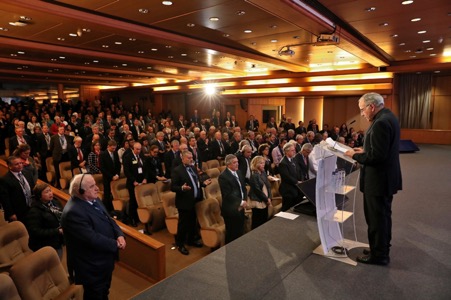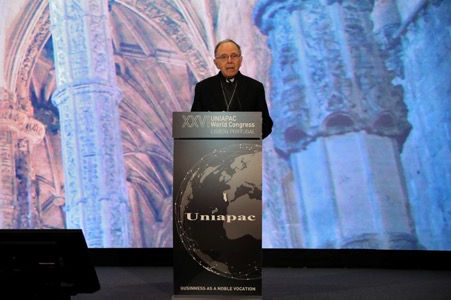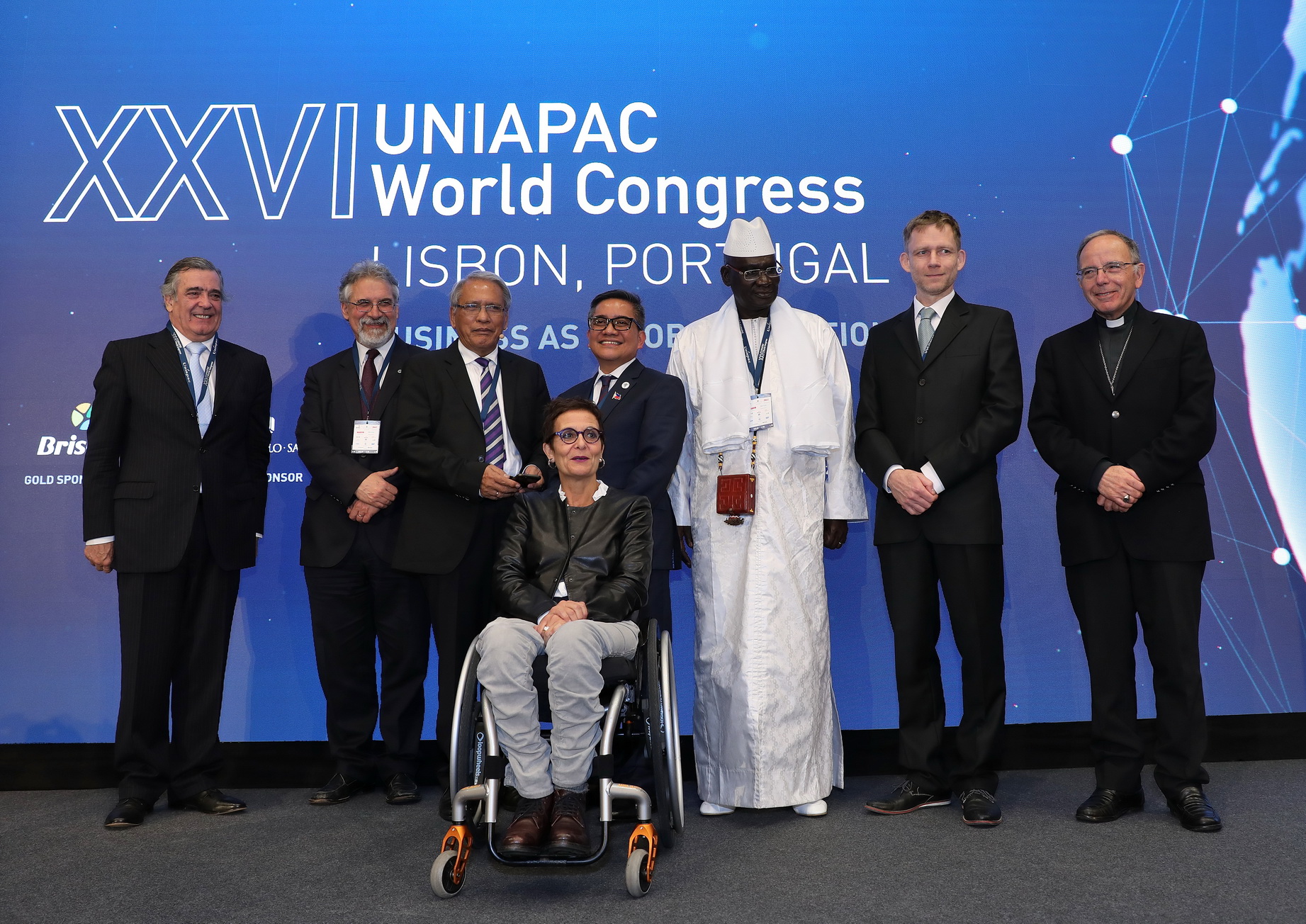“To unify themes that give meaning or purpose to our daily routines, but also to the ones who work with us or for us” and make them extensive to the communities where we are included is a good means to define a mission that goes far beyond the own profit and aims to work for the common good. The themes that animated the two first panels of the UNIAPAC World Congress were testimonies from who has overcome many personal adversities in order to be able to find himself in “others” and the urgent promotion of “the different and vulnerable ones”’ inclusion in the enterprises.
BY HELENA OLIVEIRA
It was with a pertinent speech adequately adjusted to the big themes in the agenda on the 2nd day of the UNIAPAC World Congress that its President, Rolando Medeiros, began the works that would gather four panels and more than twenty speakers [the present article is dedicated to the first two]. After a morning prayer pronounced by the Lisbon Cardinal, Don Manuel Clemente, he began by referring that science, technology, free market and democracy allowed the society to attain levels of knowledge, freedom, life expectation and abundance without precedents, and so, worthy of being celebrated. However, Rolando Medeiros opposed the “collateral effects” of all those achievements. That is, “technology gives us power, but it can´t guide us towards the best way to use it; the market offers us choices, but it doesn’t orientate us to the “how” those choices must be done and the liberal democratic state concedes us freedom to live the way we want, but it refuses, as a rule, to clarify the way we should use those options of life”. In short, and as he concludes, the result is that “the 21st century leaves us with a maximum of choices and a minimum of meaning”.
The search of meaning and/or purpose inside ourselves is a continuous quest done since immemorial times. But for the UNIAPAC president our “me” is a poor place to be found. As we also know, the pursuit of the purpose in management has been his big crusade during this last decade. That purpose has changed first into just a buzzword, but, with time – and times – it has attained a top place in the podium of the entrepreneurial leaders’speeches, levelled with the so called “mission” or even overcoming it. And if in many cases purpose may be just an empty and meaningless word, the truth is that for many enterprises and their leaders finally it became the true objective of business.
This way Rolando Medeiros gives the theme for the first panel of the day, questioning whether “commitment” may really constitute an “essential objective able to unify matters that give meaning and purpose to our daily routines, but also to the ones who work with us or for us.”
For that he also assures that “all of us have the choice and the power to find a purpose on a large scale in the roles we play in our enterprises if we concentrate on our talents, skills, competences, thoughts and energies in a permanent way that leads business to truly serve the common good”. For the president, “all of us are able to devote ourselves to a cause we consider to be a noble purpose”. But it is also true that this effort may become a paradox. A paradox that, according to Rolando Medeiros, and without spending a lot of time thinking of our personal gains, seems to be the most right path to happiness, more than the mere persecution of that same happiness only aiming our own profit”.
21st century offers us a maximum of choices and a minimum of meaning, Rolando Medeiros
For the 1st panel a group of leaders was chosen. They testified the transparency of this same paradox through the sharing of their personal search and of the successes and obstacles they have found on the way they have chosen aiming the purpose of what they are doing. And the president hopes that their actions may inspire and motivate the personal necessary change to reach the nobility of the vocation.
Call, cooperation, defeat fear and care about the “other”
After a brief introduction by João César das Neves, who doesn’t believe that new commandments are necessary to management, but rather to accomplish the one cited by Jesus as the “big commandment in Law” (Matheus 22:36-37) – to love God with all our soul, all our heart, all our mind and all our strengths – as well as love our neighbour, five speakers shared their experiences in the search of meaning for themselves, the meaning that is finally and equally expressed in the good they do towards the others.
The main objective of the AMH Group is to disseminate our model in order that the others may appropriate it, Amina Laraki-Sloui
Amina Laraki-Sloui is Moroccan, Muslim and, after an accident in 1992 that placed her on a wheelchair, she decided to found the AMH Group in Morocco, whose mission is to help people with incapacities or in vulnerable situation and alert to the prejudice and the stereotypes around them. As one of the largest organizations without profit- making in the region – “rich people pay for the poor ones, in a relation of five independents for one dependent”, as she affirms – in the area of health the AMH Group leads several physical and functional rehabilitation centers, among which Noor Centre is the most known and a pilot-project already replicated in other places in Morocco, and in education it is represented by Tahar Sebtiâ Institution that offers an educative program from preschool till the end of primary teaching to 480 children, focusing on the personal development independently from their socioeconomic statute or incapacity. Amina always assumes her project as a social enterprise or a platform of social innovation in open source “whose main objective is to disseminate the model so that others may appropriate it”, she affirms. Bearing in mind that “the world is hostile” [particularly facing “different” or more vulnerable ones], the Moroccan, who is also an activist, believes that the answer may be “on the promotion of communication and in the art of mixing talents and living together.” “I´m Moroccan, but I believe what Jesus said: ‘to love and take care of the weakest’”, she concluded.
Djisman Simandjuntak , from Indonesia, is the headmaster of the Prasetiya Mulya University, the first one to integrate a business and economy school in the region. As the president of the administration council in a mining enterprise, Simandjuntak confessed it is complicated, but not impossible, to balance this particular entrepreneurial activity with the creation of values in the involving community, the same time he faces very specific challenges in his country, with very reduced levels of literacy and competences, and with a very hard cultural and religious diversity to lead. His enterprise and his program “Responsible Company in Action” try to harmonize the complex mining activity with the values he “shares with society”, choosing education and the creation of competences through a “complex net of cooperation” that, according to him, consists of the pinnacle of development.
To bet on education and the creation of competences consists of the pinnacle of the development, Djisman Simandjuntak
Similarly thinks Slovak Michal Hrabovec, president and co-founder of Anasoft, a well successful software enterprise. With an enormous humility and a certain nervousness, he shared with the audience the burden he carries facing the responsibility and accountability – another idea much stressed in the congress – inherent to his CEO position and the fear of failing he felt when, 19 years old, decided to open his enterprise, always considering that one should choose the most difficult way, and not the easiest one. Patience, courage and capacity in assuming risks – never putting aside to dream – and overcome fears leaving his comfort zone are the states of mind that have accompanied the youngest entrepreneur on stage. His enterprise, awarded with the prize Year Enterprise in Slovakia and recognized by several other prizes related to his social responsibility activities, has as an objective to prove that “entrepreneurship hand in hand with technology may create a new value for all humanity”.
This round of testimonies also included the Philippine Tito Serafica, president of the administration council of the Brotherhood of Christian Businessmen and Professionals (BCBP), who stressed the necessity of “changing the grey into white” – or fear into freedom – assuring that there shouldn’t be any “dingy” zone between the spirituality and the vocation and call to which many leaders are open. For Serafica, as president of the administration council and CEO of the Premiere Horizon Alliance Corp that operates in the areas of real estate and mining, it is always necessary “to do a faith jump”. The motto of his enterprise is “we do not overcome challenges making the problem smaller, but rather making us bigger” and it has accompanied him since ever, particularly because some years ago, and as a Christian, he suffered an enormous dilemma: to have to manage an online casino that, worsening it, was flat broke.
I carry an enormous burden facing the responsibility and the accountability inherent to my position as CEO, Michal Hrabovec
The panel also included Aimé Séne who “dreamt to be rich and share his richness with his fellow countrymen.” The Senegalese entrepreneur, CEO of Hertz and founder of several successful enterprises, is well known for his social work at many levels he has provided service in a poor country from the building of schools to the bet in better health conditions for maternity or the improvement of the sanitation conditions and others in some of the poorest quarters in Senegal.
Who better than us may change the world for better?
The moderator of the second panel of the day was Ruy Diniz, executive director of “Mello Saúde” who elected inclusion – the theme in debate – as one of the biggest “tasks” for the entrepreneurial leaders. “Because enterprises are made by people, made to serve people and because it is necessary to bring the largest number of people inside them, what we have to be convinced of is that each person has his own value and it is urgent to stimulate his inclusion where we work and where we live”, he affirmed.
Before going to the panel of speakers – all of them directly or indirectly related to the debated theme – Randy Lewis, the ex-vice-president of Walgreens and the precursor of a extremely well successful model of hiring people with deficiency, inspired by his own son, autistic, and replicated in many other big enterprises, “filled and stuffed” the stage with his good-humoured presence, also possessing the gift of telling good stories. Randy Lewis’good story may be consulted in more detail in an interview he gave to VER, but, in short, the also founder of NOGWOG Disability Initiative, a non profit organization, dedicated to expanding the hiring of people with incapacity in the highest number possible of enterprises, spoke not only about the ways that conducted him to present to the administration council the pioneer idea of “hiring a labour force it would never hired”, as he convinced, with numbers and parallel narrations the present entrepreneurial leaders, by saying that these people have a performance as good as the one of their “normal” congeners, or even better.


